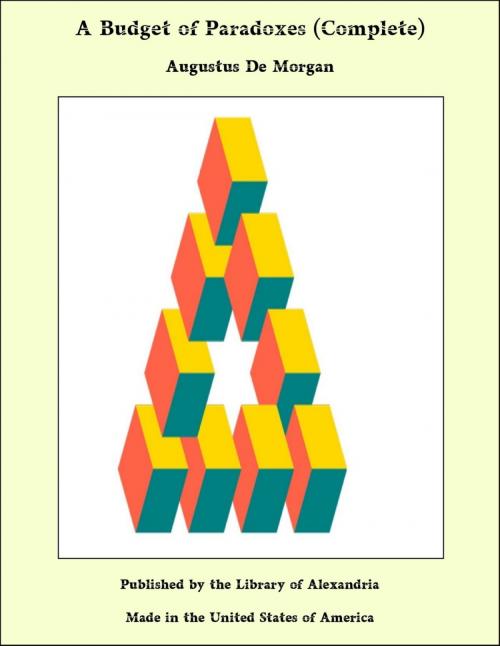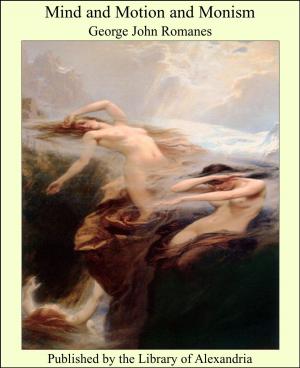A Budget of Paradoxes (Complete)
Nonfiction, Religion & Spirituality, New Age, History, Fiction & Literature| Author: | Augustus De Morgan | ISBN: | 9781465544513 |
| Publisher: | Library of Alexandria | Publication: | March 8, 2015 |
| Imprint: | Language: | English |
| Author: | Augustus De Morgan |
| ISBN: | 9781465544513 |
| Publisher: | Library of Alexandria |
| Publication: | March 8, 2015 |
| Imprint: | |
| Language: | English |
If I had before me a fly and an elephant, having never seen more than one such magnitude of either kind; and if the fly were to endeavor to persuade me that he was larger than the elephant, I might by possibility be placed in a difficulty. The apparently little creature might use such arguments about the effect of distance, and might appeal to such laws of sight and hearing as I, if unlearned in those things, might be unable wholly to reject. But if there were a thousand flies, all buzzing, to appearance, about the great creature; and, to a fly, declaring, each one for himself, that he was bigger than the quadruped; and all giving different and frequently contradictory reasons; and each one despising and opposing the reasons of the others—I should feel quite at my ease. I should certainly say, My little friends, the case of each one of you is destroyed by the rest. I intend to show flies in the swarm, with a few larger animals, for reasons to be given. In every age of the world there has been an established system, which has been opposed from time to time by isolated and dissentient reformers. The established system has sometimes fallen, slowly and gradually: it has either been upset by the rising influence of some one man, or it has been sapped by gradual change of opinion in the many. I have insisted on the isolated character of the dissentients, as an element of the a priori probabilities of the case. Show me a schism, especially a growing schism, and it is another thing. The homeopathists, for instance, shall be, if any one so think, as wrong as St. John Long; but an organized opposition, supported by the efforts of many acting in concert, appealing to common arguments and experience, with perpetual succession and a common seal, as the Queen says in the charter, is, be the merit of the schism what it may, a thing wholly different from the case of the isolated opponent in the mode of opposition to it which reason points out. During the last two centuries and a half, physical knowledge has been gradually made to rest upon a basis which it had not before. It has become mathematical. The question now is, not whether this or that hypothesis is better or worse to the pure thought, but whether it accords with observed phenomena in those consequences which can be shown necessarily to follow from it, if it be true. Even in those sciences which are not yet under the dominion of mathematics, and perhaps never will be, a working copy of the mathematical process has been made. This is not known to the followers of those sciences who are not themselves mathematicians and who very often exalt their horns against the mathematics in consequence. They might as well be squaring the circle, for any sense they show in this particular. A great many individuals, ever since the rise of the mathematical method, have, each for himself, attacked its direct and indirect consequences. I shall not here stop to point out how the very accuracy of exact science gives better aim than the preceding state of things could give. I shall call each of these persons a paradoxer, and his system a paradox. I use the word in the old sense: a paradox is something which is apart from general opinion, either in subject-matter, method, or conclusion.
If I had before me a fly and an elephant, having never seen more than one such magnitude of either kind; and if the fly were to endeavor to persuade me that he was larger than the elephant, I might by possibility be placed in a difficulty. The apparently little creature might use such arguments about the effect of distance, and might appeal to such laws of sight and hearing as I, if unlearned in those things, might be unable wholly to reject. But if there were a thousand flies, all buzzing, to appearance, about the great creature; and, to a fly, declaring, each one for himself, that he was bigger than the quadruped; and all giving different and frequently contradictory reasons; and each one despising and opposing the reasons of the others—I should feel quite at my ease. I should certainly say, My little friends, the case of each one of you is destroyed by the rest. I intend to show flies in the swarm, with a few larger animals, for reasons to be given. In every age of the world there has been an established system, which has been opposed from time to time by isolated and dissentient reformers. The established system has sometimes fallen, slowly and gradually: it has either been upset by the rising influence of some one man, or it has been sapped by gradual change of opinion in the many. I have insisted on the isolated character of the dissentients, as an element of the a priori probabilities of the case. Show me a schism, especially a growing schism, and it is another thing. The homeopathists, for instance, shall be, if any one so think, as wrong as St. John Long; but an organized opposition, supported by the efforts of many acting in concert, appealing to common arguments and experience, with perpetual succession and a common seal, as the Queen says in the charter, is, be the merit of the schism what it may, a thing wholly different from the case of the isolated opponent in the mode of opposition to it which reason points out. During the last two centuries and a half, physical knowledge has been gradually made to rest upon a basis which it had not before. It has become mathematical. The question now is, not whether this or that hypothesis is better or worse to the pure thought, but whether it accords with observed phenomena in those consequences which can be shown necessarily to follow from it, if it be true. Even in those sciences which are not yet under the dominion of mathematics, and perhaps never will be, a working copy of the mathematical process has been made. This is not known to the followers of those sciences who are not themselves mathematicians and who very often exalt their horns against the mathematics in consequence. They might as well be squaring the circle, for any sense they show in this particular. A great many individuals, ever since the rise of the mathematical method, have, each for himself, attacked its direct and indirect consequences. I shall not here stop to point out how the very accuracy of exact science gives better aim than the preceding state of things could give. I shall call each of these persons a paradoxer, and his system a paradox. I use the word in the old sense: a paradox is something which is apart from general opinion, either in subject-matter, method, or conclusion.















